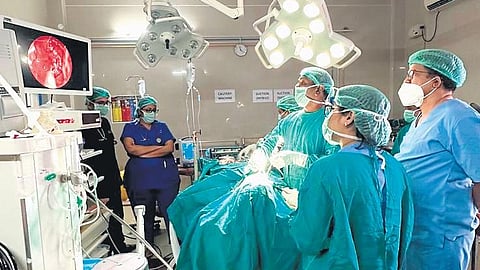

Across India, a seismic shift is underway. Gone are the days when retirement meant rocking chairs and quiet resignation to pain. Today, senior citizens want to stay active, engaged and independent, free from the debilitating limitations of spinal conditions.
This has ignited a surge in demand for spine surgery, particularly minimally invasive techniques that offer promising solutions without the trauma of traditional open procedures. For decades, major spine surgery, with its extensive incisions and lengthy recovery periods, was deemed too risky for older patients.
However, this perception is rapidly changing, illuminated by the emergence of advanced, minimally invasive techniques, particularly full endoscopic spine surgery (FESS). As we age, our spines are prone to a variety of degenerative conditions that can significantly impact our quality of life. These include lumbar degenerative disc disease, spinal stenosis, degenerative scoliosis, cervical disc degenerative diseases and compressive myelopathy, and osteoporosis.
These conditions were once considered untreatable in older adults due to the risks associated with traditional open surgery. However, FESS offers a game-changer. Full endoscopic spine surgery FESS represents a revolution in surgical artistry. Imagine delicate instruments accessing the spine through keyhole-sized incisions, meticulously navigating through natural tissue planes to achieve the desired correction.
This translates to minimal blood loss and tissue damage, significantly shorter hospital stays (often just 24-48 hours) faster recovery and quicker return to an active life. The benefits of FESS extend far beyond physical recovery. It empowers our seniors to maintain their independence and participate in daily activities without pain or limitations, stay engaged with their families and communities, fostering stronger social connections and pursue their passions and hobbies, rediscovering the joy of an active life. Data-driven results The success of FESS is backed by compelling data.
Studies have shown: Low rates of morbidity and mortality in elderly patients undergoing FESS for spinal stenosis, disc herniation, and other conditions Remarkable improvements in pain and function, with many patients reporting significant pain relief and restored mobility Effective identification of ideal candidates through patient-specific assessments, ensuring optimal outcomes for a wider range of older individuals Prevention is key to upright living While FESS offers a powerful solution, proactive spine health practices are key to minimising the risk of developing degenerative conditions.
These include: Maintaining good posture: Standing tall and sitting up straight helps distribute weight evenly on the spine, reducing stress and strain Regular exercise: Low-impact activities like swimming, yoga, and walking strengthen core muscles, improve flexibility, and support spinal health Managing weight: Excess weight puts additional pressure on the spine, accelerating wear and tear.
Maintaining a healthy weight reduces this risk Strengthening bone health: Adequate calcium intake and vitamin D supplementation, along with weight-bearing exercises, can help combat osteoporosis and prevent bone fractures Beacon of Hope Full endoscopic spine surgery is not merely a medical marvel, it's a cultural touchstone. It empowers seniors to reclaim their lives and rewrite their narrative.
They can climb their grandchildren's forts, tend their gardens and embark on long-awaited pilgrimages, unburdened by pain. The joy of regained mobility ripples outward, enriching lives of their loved ones and the fabric of society itself. FESS limitations While FESS offers transformative solutions, it's important to acknowledge its limitations. Open surgery may still be preferable for complex cases like severe cervical spondylosis or scoliosis. However, FESS remains a powerful tool for alleviating pain and improving function, even in such situations.
By offering a minimally invasive alternative, FESS empowers not only those with degenerative conditions but also those with osteoporosis, giving them a choice to manage their pain, maintain independence and live life upright. While FESS offers a transformative solution, prioritising preventive measures ensures a life lived vibrant and upright.
(The author is a consultant, department of neurosurgery at Apollo Adlux Hospital, Angamaly)